#that placed emphasis on applied knowledge
Text
I may be having an Autism Realization
Like. Patterns are cool right??? Human pattern recognition is astounding and beautiful and part of what makes us unique? Shapes and Numbers and Words?
Seeing shapes and faces in the clouds and in shadows and in the bits of dirt and debris littering the world? How root woods connect and allow you to know the meanings of words you’ve never heard before? How the 9s times table goes 09 18 27 36 45 54 63 72 81 90???? How people an animals behave? The way speech and slang and dialect differs and yet can be so similar?
#babblestar#polls#autism#patterns#beginning to realize how undiagnosed autism…#may have sort of played a Significant Role in my youth as a gifted and talented kid#who then did NOT do well in higher education#that placed emphasis on applied knowledge#turns out maybe it’s not the gifted kid burnout#it might just be very autistic pattern recognition#i just like#realized this#kinda assumed it was like#something nerds appreciated#like the way pattern is part of human brains#the way language works#the way it’s an intersection of math and art#it’s everywhere#everything is patterns
58 notes
·
View notes
Text

Deenbandhu Chhotu Ram University of Science & Technology is committed to providing a holistic educational experience to its students. The university strives to create an environment that encourages intellectual growth, critical thinking, and problem-solving skills. With a dedicated faculty that includes experts in their respective fields, students can expect to receive quality education and guidance throughout their academic journey. Furthermore, the university actively promotes research and innovation, offering numerous opportunities for students to engage in cutting-edge projects and contribute to advancements in science and technology.
Web Site:- www.dcrusm.org.in
#eenbandhu Chhotu Ram University of Science & Technology has a strong reputation for its commitment to academic excellence and providing stud#ensuring that students have diverse options to choose from. With state-of-the-art facilities and experienced faculty#Deenbandhu Chhotu Ram University of Science & Technology provides students with an ideal environment to enhance their knowledge and skills.#the university places a strong emphasis on practical learning#enabling students to apply their theoretical knowledge to real-world situations.#Web Site:- www.dcrusm.org.in
0 notes
Note
That Xiran Jay Zhao video about the amount of time it takes to get paid by the publisher, a couple of time she says "that's just the way it is." Are there actual, legitimate business reasons for holding off paying someone 6 or 8 or more months what they've earned for their book? Or is it the publisher basically going "We'll pay you when we pay you. What are you gonna do about it?" because they're essentially the one in charge?
And is it the same for all authors? Or is there an unofficial "tier" system based on your name? Are they telling people like Stephen King or James Patterson or Neil Gaiman "you'll see your money in 8 months" or are they more likely to be getting monthly checks just because of who they are?
There are some legitimate business reasons, yes.
Okay, so let's look at the way a book is sold to a publisher. I'm going to use very round numbers, because I don't want to do a lot of math right now. So say I sell a book for $15,000 under the traditional three installment contract--signing, delivery/acceptance, and publication. What this means is I sign the contract, I get a $5,000 check! Yay! I will also get checks when the book is turned in and accepted, emphasis because it means I can't just give them a word jumble and claim I turned the book in, and then again when the book comes out. We're ignoring side situations like "book is never turned in" and "book is never published."
But wait! My agent gets 15% off the top of each of those checks, which isn't a whole lot at $5,000--$750--but means I'm receiving effectively a $4,250 check, and then waiting maybe a year for the next one.
In the US, 1/3rd of that check goes automatically to taxes, and I cannot math that very well, but it's about $1,416. So I'm left with $2,834 as my payment for the year. This is why most authors will have day jobs.
This structure makes sense. They pay you to call dibs on your book: they pay you when the dibs pan out: they pay you when they can start making money. Now, recently, some publishers have started going to a four stage advance payment, and I can't see any real justification for that. Maybe someone will give me one. I'd be fascinated to know what it is.
So here's the thing: until the book is out, there is no more money. You've been paid for the book, but it's not making money for the publisher yet, and so of course you're not getting more money. It used to be the expectation that your advance would pay your bills while you wrote the next book; that is clearly no longer the case. I live in Seattle. A single check from a three-stage advance isn't paying my mortgage for a month. But.
Once the book is out, it can start making money, and that's when things get complicated. Say a bookstore places an order for 10 copies of AWESOME NEW BESTSELLER. Yay! That should be ten sales, and ten units of whatever your royalty is, right? Only these are physical items, and bookstores can return them, so your publisher marks it down as "ten sales, five reserve against returns," meaning you're only getting credit for five sales until the return window (usually a year) runs out. Where it gets a little hinky is when the bookstore sells all ten and orders ten more, and the publisher still has it marked as "five (now ten) reserve against returns." Basically, you're only getting credit for half your sales until that reserve window closes.
Sadly, thanks to certain retailer policies, this has been grandfathered into applying to electronic sales as well.
TL,DR: The delay in royalty payments is to give bookstores time to sell the books, and mean that your publisher doesn't pay you for a hundred sales, only to ask for the money from fifty to be given back when books are returned. This could happen faster in the modern world, but that would involve publishers paying us faster, and they like to keep the money in their hands as long as possible.
To the best of my knowledge, no one is A Big Enough Author that they can demand their money now, right now. And this is why trad publishing continues to self-select for the wealthy and the young.
3K notes
·
View notes
Text
his f-18, his bronco, his favorite sports teams and you || bradley 'rooster' bradshaw
pairing: bradley 'rooster' bradshaw x mitchell!reader
synopsis: you claim there are a select set of things rooster pays attention to and remembers information about. those being his f-18, bronco, and favorite sports teams. however rooster is quick to correct you seeing as you left off one very important thing on that list, you.
warnings: n/a, just some short and sweet fluff
note: not edited! rooster has me in an absolute chokehold, enjoy lovlies.
ps. i may or may not have a rooster x mitchell!reader multific story in the works 👀 let me know if thats something you'd be interested in!
masterlist
*I do not give consent to my work being posted, translated, copied or published to any third-party site. If you see my work reposted anywhere, please reach out and let me know.*
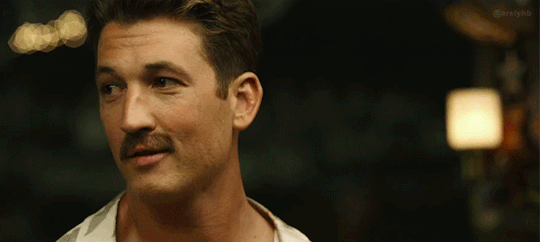
“Roo, baby, you know I love you from the absolute bottom of my heart but I don’t trust your cooking. Stay out of my kitchen.” You order sweetly, pointing toward the living room with the spatula in your hand.
Rooster had come waltzing in a few moments ago, his baseball game having cut to a commercial break, and with one look at you buzzing around the kitchen with your hair messily pulled back against your head as you multitasked getting things prepped for tonight's dinner, had announced that he wanted to help.
To which you said absolutely not and he immediatley wanted to know why leading to the converstation you were currently having.
He grabbed at his chest, face twisting in offense, “Excuse you, for your information I am a fantastic cook. Carole Bradshaw insured that.”
“And I have nothing but the utmost absolute faith in Aunt Carole’s abilities. What I don’t have faith in is your ability to pay attention and retain the knowledge of anything that doesn’t have to do with your F-18, Bronco or favorite sports teams.”
“Are you calling me dumb Y/n Mitchell?” He accused.
���I never said that Bradley Bradshaw, I only meant that your talents and intelligence are more aptly applied in places that aren’t my kitchen.” You countered, putting emphasis on his name the way he did yours.
He stared at you for a moment, eyes playfully narrowed, trying to come up with good enough response to defend himself against your argument. He repeats your list mentally to himself; His F-18, his bronco, his favorite sports teams and...wait a minute-
Rooster's head cocked to the side and a smirk spread across his face as a thought suddenly dawned on him. You rose an eyebrow as he placed his beer down on the kitchen island and took a step forward crossing the distance towards you, “What are you doing?”
“You left something off that list,” he said softly, taking another step forward and pinning you to the counter with his hips. His hands went forward to rest on the edge of the marble on either side of your waist, leaving you with no where to go.
You furrowed your eyebrows and smiled in confusion up at him, “What?”
His closeness was disarming and you never could think straight in his presence. Especially not with those dark brown eyes locked so intensely on yours, so your earlier argument had already slipped from your mind.
“The list of things that you said I pay attention to and remember stuff about, you forgot something.” He repeated, breath fanning lightly across your face, “It's my F-18, my bronco, my favorite sports teams and you. I always pay attention to and remember anything to do with you baby.”
Your breath hitched and you instantly became putty in his arms, heart melting right along with the rest of you.
Your suddenly hit with the rush of an overwhelming amount of love for the man in front of you. Surging forward, you closed the small gap between you and brought your lips together in a passionate kiss. Your arms circled themselves tightly around his neck, spatula dropping forgotten to the floor, as you tried with every fiber in your being to express through your kiss just how much you freaking loved and adored him.
The pair of you don’t separate until you both desperately need to breathe, gasping lightly as you do for air. Your arms remained in their locked postion around his neck, preventing him from putting any space between you, so he simply lowered his forehead to rest against yours, eyes falling shut.
It’s silent between you for a few more moments as you basked in one another’s touch, breathing the same breath, before you break it by whispering, “I still don’t trust you in my kitchen.”
Rooster doesn’t react at first but then suddenly he bursts into loud boisterous laughter. His head dropping down to your shoulder, body shaking against yours with the force of it.
He manages to recover a few seconds later and still slightly chuckling, squeezes your waist before lifting his head up and pressing one more soft kiss to your lips.
Rooster then proceeds to back away, freeing you from your postion pinned against the counter, and grabbed his beer off the island to return to his game.
“Whatever you say honey.”
#top gun maverick#rooster x reader#bradley rooster bradshaw#mitchell!reader#pete maverick mitchell#pete mitchell#maverick mitchell#bradley bradshaw#top gun imagine#jake hangman seresin#payback#top gun#rooster bradshaw fic#rooster bradshaw imagine#bradley bradshaw x reader
4K notes
·
View notes
Text
it's always a joke i see passed around, but it's also based in a misconception of it, but roman and greek mythology are vastly different.
roman gods and goddesses were named after objects and did not possess a gender, whereas greek gods were decided by human characteristics and traits.
2. greek gods had heavy emphasis placed on their physical appearance, both beauty, and unsightliness. the description of their physical appearance would come from the myth itself. greek mythology would describe the gods and goddesses as having strong characteristics. these characteristics would have a direct impact on the physical appearance they were given, while roman gods were not described in such a way. roman gods had less emphasis put on their characteristics; therefore, their physical appearances were less strong if there was a physical depiction of them at all.
3. many myths are told differently like the trojan war and odysseus' return.
4. in greek mythology, mortal greek heroes were just as important as greek gods and goddesses. greek heroes often had roles that taught life lessons that were just as important as the myths that were told about greek gods and goddesses. greek mythology emphasized the importance of good deeds mortals performed on earth. roman mythology was different in this way. roman mythology did not put emphasis on the works of mortal heroes in regards to their life on earth because roman mythology believed in an afterlife (greeks did too but not in a strong way as romans did).
5. the greek culture viewed deities as an unattainable being. this means that mortals would never be able to reach deity status and have a place among the gods they worshipped. instead, they would have to do good works on earth to have the honor of the gods during their time on earth. roman culture was different. romans believed that mortals should try to aspire to be like the gods they worshipped. part of the reason is that they used the roman gods and goddesses as an inspiration to live life the right way. the other reason is that they believed in an afterlife that they would attain when their life on earth was over.
6. the gods had much different attributes differing from greek and roman; ares was the unpredictable spirit of war, and he wasn't the most popular god, but in rome, mars was hugely popular and was worshipped much more than the greek ares. demeter was the goddess of the harvest and grains, while ceres was those things as well plus art and culture.
7. in greek mythology, the afterlife does not hold much importance. in fact, gods and mortals are regularly snatched from the afterlife and brought in to the present showing no concern for the afterlife. the greek perspective is much more concerned with the physical life on earth as opposed to the afterlife. mortals are remembered and rewarded for their good deeds on earth. in contradiction, the romans did good deeds to secure their place in afterlife. they could even earn a place among the gods and through their life on earth strove towards this goal.
i know it's funny to be like "romans copied greeks," i don't view it as copying and pasting, i view it as the being inspired by greek gods and greek mythology and applying it to their own religions, and that's not a weird, uncommon thing. greeks also borrowed from other cultures to form their own gods. ancient greeks borrowed from minoans, mycenaeans, egyptians and phoenicians. THAT IS NOT A BAD THING! greek language also helped expand the italian language as well, they expanded their own knowledge with knowledge they learned from greeks, and other cultures they came across.
another complaint i see is "they conquered greece, so greeks didn't have a choice." i don't know how to tell you this in the most polite way, but conquering land in this time was gigantic and very common and normal! how do you think the mongolians became so powerful, they didn't do it through peaceful encounters. everybody did it, it's how culture spread so rapidly through the ancient world, not to mention through trade.
i know it's funny to say the italians copied greeks, but get over yourself, it's not funny nor is it correct.
#ive seen many uneducated comments and i had to set some of the picture straight#greek mythology#roman mythology
274 notes
·
View notes
Text
Job Roulette.. or Not: A Post about Alter Roles
Roles like Hosts? Protectors?.. maybe a Cleaner? an Academic?.. why is there an alter who comes out only for driving?! What about these other alters who don't really do much--they got to have one right??
--Are probably what you might be thinking when this topic comes up. But, there's something more into it,, it's not all about what job or how the role is assigned to an alter only.
Well, for this post, lets talk EVERYTHING about how roles work, what kinds exist, why it's there?? And especially, why are some more task specific, multi-role, or even... none? Bowl straight to the point, let's roll out. Haha punny
Ok J, spill. What are they?
Hold on. Im pulling out this dictionary definition of it--ah!
"defined positions that are associated with given responsibilities and are usually allocated according to the position or ability of each person."
To put it in system terms, it's how different parts can do something that others couldn't, or, feel a sense of responsibility in one particular aspect. That's making sense right? But oh.. you still want to know why they're there at the first place. Fine, follow me!
Yeah, show me why!
As aforementioned, this disorder boxes up our different parts of selves with amnesia and weaker bonds of connection which really sets us back on easing our 'modes' for different situations.. not only that, a part's moods and state/personality can greatly affect what kinds of jobs they get, it's not so random as you'd thought.
So, thing is, because some alters have a distinguished ability capable in doing something, depending what fragment or pre-existing knowledge/experience it holds, that can become it's very own job task.
They can be hereditary (upon split or formed), gained (fuse or passed traits), or even learnt (by its own commitment, without any prior skills). Roles come from many origins, and none of them are so different.
But, some are more complex..
I get it, some can have more than one, have ultra specific ones, or literally just don't have any. Now it makes you think--if it was from predisposed strengths each alters naturally have, then why are some more niche? or like, anything else? I know why:
Our brains are complex alright. We both can think maybe we can do (even if we don't like it) and not do something, and these are all compartmentalized in each alters, so basically its part feelings, part acceptance of such trait, and part commitment as the formula. Even confidence or the call to action affects this outcome!
This can apply to who can handle more than one jobs, or for those who are more specific or lesser known roles. In fact, roles do not have any limits, they are specifically tailored for your functionality so don't fret if you have an alter who's job is only to sleep, or anything else 'silly' !
What about the ones without.. roles?
Do you think it feels wrong to not have roles? While it is true that roles are needed, they're not actually a required standard for everyone to have a job task. Mainly, ANP's are the one who usually have roles, but EP's can too.
If they do not have a role, they might be disinterested or think they don't have any potential, or sometimes they're only there to hold memories / don't have the qualified skill sets, and thats okay! You can take proactive action in anyhow you'd like, just remember, every parts aren't forced to contribute, you know? It doesn't make them useless, maybe more on passive support/back ups.
I've also seen some systems who don't really have roles because the alters are all well-rounded, as in pick up other's tasks and that they're not assigned/compelled to do a particular job at all times, like being flexible. everyone's different!
Make sense, anything else?
Well, that we are not bound to roles, they do not define us, and that we can lose, or change roles according to our growth. Have anyone ever mentioned that?
Im aware that we tend to put too much emphasis on having jobs and being contributive, but the most important thing to keep in mind is that we all in this together, and to help each other, in a way or another.
Never forget that you're more than your job! Maybe try to enjoy other parts of life, yeah?
--
Thats the end of the post. What will you do if you find a new alter with no impressions of having a role? How do you see roles in your own pov? What's the first thing you'd do if you were to be free from your job task, if any? Feel free to let me know, i hope this has been informative, im willing to add anything if something's missing!
- j
#did#actually did#did community#did osdd#did system#dissociative identity disorder#sysblr#plural#system stuff#jeducates
79 notes
·
View notes
Text
A Somewhat Messy Exploration of the Concepts of Purity and Impurity in Satosugu, and perhaps some more

The yin and yang symbolism in Satosugu (here I'm using 'Satosugu' as a short way to refer to the relationship between these characters, not necessarily a ship dynamic) has been brought up and discussed a lot in fan analyses lately, and by those who have mental capacity to express it far better than I ever could. However, there is one more thing I would like to talk about in relation to Suguru Geto and Satoru Gojo's dichotomy, and perhaps some more.
As much influence as Chinese philosophical concepts (such as already mentioned yin-yang) have on Japanese cosmology, religious views of the people of Japan are actually an intricate and complex amalgamation of various teachings and beliefs, with Shinto being numerically the most prominent faith of the country. I was curious as to how the ideas found in Shinto could be applied to Gojo and Geto's relationship, and I guess I've stumbled upon some inkling of a thought in this regard -- so please bear with me while I rant.
Before this gets too long, I'm putting my rambling below the cut.
To begin with and give a little bit of context, the core teaching of Shinto is to have profound respect and reverence for nature. As a polytheistic and animistic religion, Shinto is defined by its belief in the kami, who are stated to inhabit all things, including objects of the surrounding landscape and various natural forces. Due to such elemental qualities of the faith, purification takes place as one of its central aspects and a widely followed practice, as well. There is a great emphasis laid on spiritual and physical purity and cleanliness. That being so, the moral categories of good and evil (or virtue and sin), so important in the western worldview, give way to a different outlook on things: the world is perceived in terms of 'clean' and 'dirty' rather than 'good' and 'bad'.
This concept finds a reflection in Gege's writing primarily through Tsumiki as someone who's essentially an embodiment of the virtue of being innocent and pure at heart. When she's brought up in the narrative, the image is frequently accompanied by flowers -- and more often than not, especially when it comes to Megumi's perspective, those flowers are white lilies. And those are one of the most common and prominent symbols of purity. When Tsumiki's innocence is symbolically destroyed with Yorozu taking over her body, white blossoms are depicted as thrashed and stained in the background. Her purity is further defiled by her death as everything related to death and decay is considered foul as it desecrates the world's natural state of cleanliness, fertility and life.
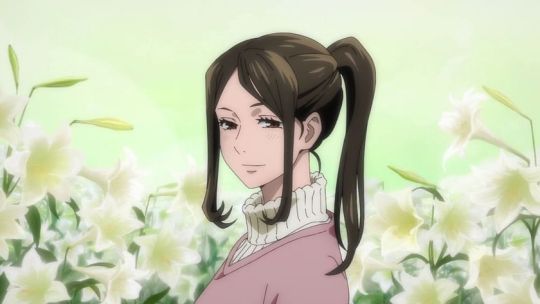
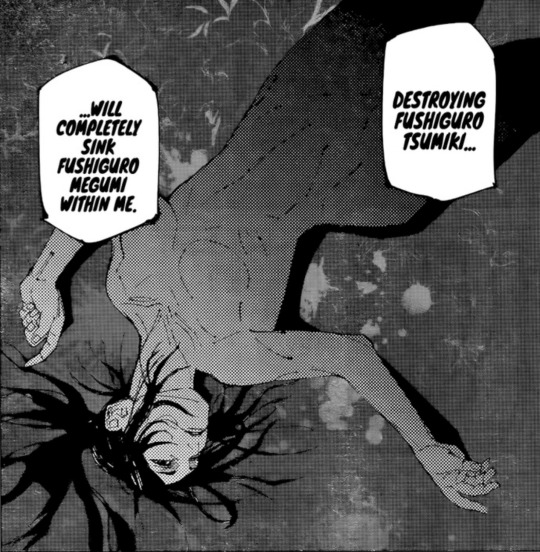
I'm only bringing this up to show how Gege incorporates this religious framework into the body of symbolism in his story. And the further you search with these concepts in mind, the more you are able to uncover.
Satoru Gojo as purity and perfection
Satoru Gojo is a character whom you can't help but read as a perfection within the context of the world he exists in. He's the absolute strongest, wielding the power to bring all the knowledge of the universe and the forces which shape it under his control, he's repeatedly elevated by the narrative as someone unreachable and untouchable whereas nothing seems to be beyond his reach. He also has an extraordinary appearance, matching vibrant aquamarine eyes with fair hair, so rarely found among full-blooded Japanese people. He embodies an ideal for his society.

Satoru is associated with white and sky blue -- the colours most widely believed to represent purity, innocence, perfection, serenity and safety. Those are lofty, noble, airy and spacious hues which also bring in mind vast open spaces and immeasurable and unreachable heights and depths, symbolizing Gojo's detachment from the mundane world where corruption and putrefaction take deep root. Not to mention Satoru's noble background as an heir of one of the Big Three Sorcerer Families.
Actually no, forget this, I do want to mention it and expand a little on my thoughts regarding Satoru's family and upbringing. It's highly likely he was overprotected and sheltered as a child, and along with a teenage-years rebellion on his part which such a childhhod brought about, it also thwarted his ability to make connections with people around him as he basically lacks common experiences and/or interests with them. He's somewhat sterile when it comes to displaying empathy and emotional intelligence, which results in a peculiar sense of innocence about him. For the lack of any better way to articulate this idea, I'd say he's pure in this regard: clean and untouchable and spotless, devoid of nearly everything that comprises a regular person's experience.
This shows even in the way Gojo chooses to cope with his trauma in the aftermath of the Star Plasma Vessel Incident. That traumatic experience seemingly barely leaves a mark on him because he opts for pushing it aside and moving forward, while going out of his way to make sure there's a safe distance between him and the source of his vulnerability by improving his technique. He fixates on bringing his Infinity technique to perfection, and as a result it leaves no opportunity for anything to touch him if he himself does not want it to. Yet again, it leaves him stainless.
Not only that: he becomes emotionally detached from the cruelty and filth of the jujutsu world, becomes numb to it, with little to no emotion ever reaching his core to shake it. He's neither angry nor vengeful on Amanai's behalf after her death. He does not allow for hatred and spite to poison his mind, neither does he feel any doubt. He stays clean from all the negativity at the cost of coming off as cynical and unsympathetic.
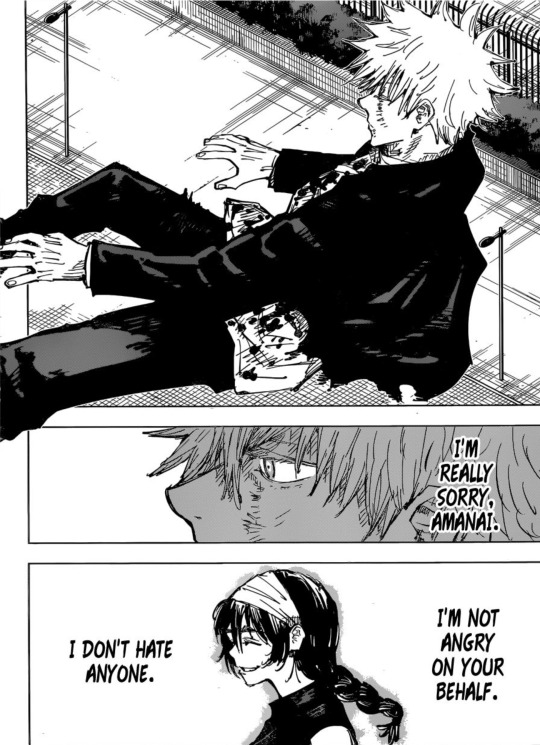
He masks this by putting up a front of an emotionally immature individual with childlike mannerisms and an attitude resembling that of a teenager rather than a fully grown man. He also nurtures a somewhat naive belief that Suguru still can be trusted, that there's some hope for him turning away from the path he's chosen. In this regard, he still bears the innocence of a child.
Last but not least, shedding away the more humanly parts of himself, Gojo instead becomes more attuned to the natural world through his ascension -- the main source of purity, as Shinto has it. Moreover, he basically rejects death by coming back from the dead after finally grasping how Reversed Cursed Energy works. And I've already explained the importance of something like this when talking about Tsumiki's passing.
Gojo Satoru's mind is free from resentment and hate, his body unstained by death. He's a character who represents complete spiritual and physical purity.
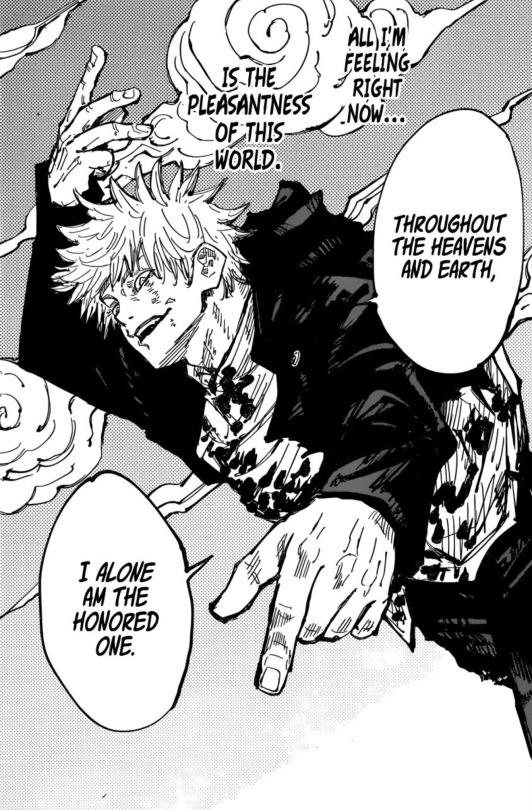
Suguru Geto as impurity and corruption
Where Gojo's character exhibits perfection, Geto shows abruptly stunted growth and degradation gnawing away at him bit by bit; where Gojo stands to symbolize cleanliness and purity, Geto presents desolation and decay and that filth which is left in their wake. Geto is a character whom the narrative treats as a symbolic foil to Gojo, starting from him being expelled from Jujutsu High and ending with his death being described in the light novel as a curse purged from existence. If Gojo serves as an example of a perfectly fit cog in jujutsu society and sets up a desirable ideal, Geto, named the worst of all known curse users, represents everything that the very same society fears and despises.
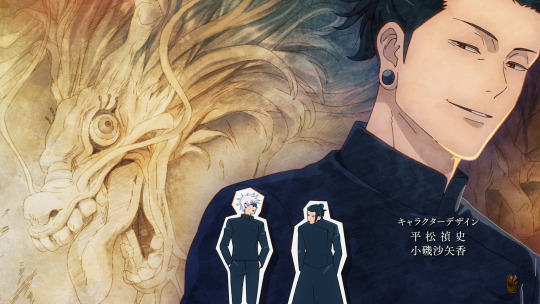
Starting with colour symbolism again, such colours as black, dark brown, warm beige and mustard yellow are the most common colours to be associated with dirt and a filthy, dingy appearance. And while I'm not saying Suguru himself has such an appearance (although he does forsake taking care of himself at some point), those all are the colours found in his palette. Black is also considered to be the hardest colour to keep clean, even more so than white, as it shows all the stains and grime so well. Which is quite interesting if you consider that Suguru's downfall and defection ultimately bring out, both to the audience and to Satoru, everything not only malfunctioning, but straightforward cruel, vile and despicable in the existing system.
Geto's deeply empathetic personality is the basis for his own corruption, his inability to set boundaries between his own emotions and the suffering of others leaves him extremely vulnerable in a society which actively punishes people for being unable to extract emotion from their duty and caring too much. The thing is, Suguru is elbow-deep in emotion. For instance, if Satoru managed to shove his feelings aside in order to put together a plan of action when Kuroi got abducted, Suguru immeadiately plunged into self-blame. His own empathy is what's clouding his vision, his feelings pile up within him without any healthy outlet until they start rotting him from the inside.
Geto lets the rot in by caring too deeply, vile emotions that he feels on behalf of others festering in his mind. He can't stand the sight of atrocities commited by Jujutsu society and finds them nauseating, while the rest of the world he exists in treats those abominations as a norm. And even so, he dives deeper into all this by trying to make a difference and save ordinary people.
This is symbolically represented by Geto's Curse Manipulation, with him consuming curses which are basically a corporeal manifestation of all the negative emotions people vent into the world in their daily lives. The more curses he absorbs, the more doubt and resentment he lets inside and the more they consequently stain his once pure ideals and aspirations with bile building up inside of him. His very sense of self is twisted by the weight of the unsightly hideous reality, and while he stays true to his strict set of ideals he is forced to adapt by the trauma of his experience as a sorcerer and the 'realisation' which it brings. Because if one endures such severely traumatic events, one must sooner or later come to the conclusion that there's something inherently wrong and malfunctioning -- either with you or the world you live in. Geto chooses to stay true to himself by assuming it's the latter, and this choice results in his corruption in the eyes of those who run that very world.
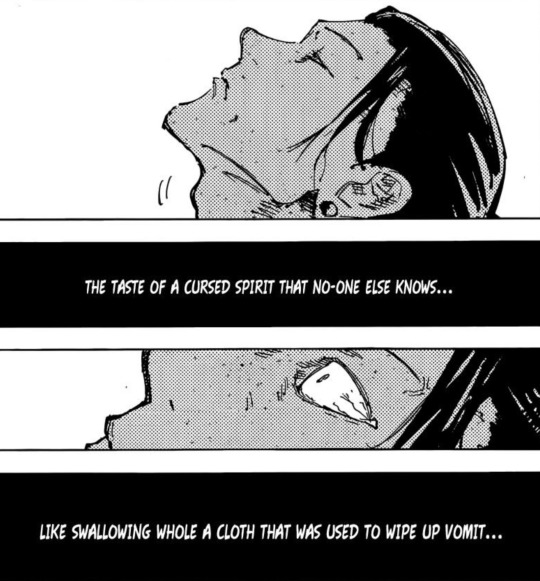
There's also something to be said about the intimacy of the act of consumpton: you let the thing you consume nurture you and become a part of you. Cursed spirits taste absolutely foul, and what that means to put this despicable thing in your mouth and swallow it is unimaginable. Geto's absorbtion of curses is supposed to represent how he basically desacrates himself by letting himself experience everything at such a deep emotional level, inevitably tying himself to putrefaction of the world.
And of course, the last thing that plays its role in the defilement of Geto's character is his death.
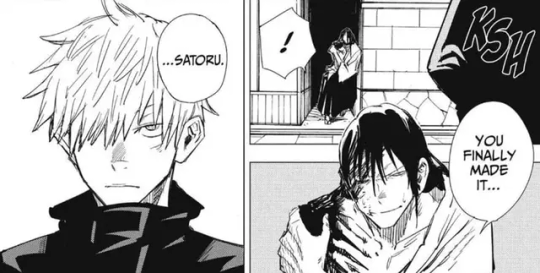
Brief wrap-up thoughts
I could honestly ramble on and on about this for ages, but I guess it all just boils down to my admiration for Gege's ability to break the mold with his writing. He takes a trait which is largely associated with protagonists of their stories and shapes his villain's whole personality around it -- and vice versa, with Gojo and his seemingly egotistic tendencies.
Once again, Japanese religious beliefs organically encompass so many elements originating from so many cultures with no coherent systematization existing up untill late 19th centuary, and I find it absolutely fascinating how Gege's story reflects that. It leaves us with such an interesting controversy of an emotionally detached hero dwelling in a morally grey area alongside with a deeply empathetic antagonist whom both other characters and the audience find deserving of sympathy and pity.
#jujutsu kaisen#jjk analysis#geto suguru#gojo satoru#satosugu#tsumiki fushiguro#she gets mentioned as well#and i still do not know how to tag properly#jjk meta#for some reason it took me so so long to finish this#are words exhausting sometimes#it seems the more i think the more scatterbrained I get#i am once again telling you#i'm sorry for how messy it is#and also#welcome to a new episode of how i'm so not normal about the religious symbolism in fiction
157 notes
·
View notes
Text
wind waker is legitimately so angsty
Spoilers ig
also tw for mentions of murder
OOT’s world is dead. Drowned beneath the waves by the hand of the gods they worshipped. It is a relic of the past that only serves as a place for the master sword and a prison for Tetra. On top of that, Gannondorf is a bitter old man now, caught in the past of his failures, the death of his entire people. He is the only gerudo left in WW. And at the end of everything, Gannondorf feels the winds that always meant death for his people, this time coming for him.
the pirates legitimately thought link died after being thrown off the tower at the forsaken fortress. Grandma, in your absence, has grown sick and is slipping in and out of consciousness when you find her. And if you’ve ever seen one the Redeads from wind waker you’ve known true fear lol
and the only person who are actually doing anything are children. Link, Tetra, Medli, Makar (whose age is debatable but he’s young in korok years so shhhhh). When you get to rito village medli is the first person to do something about Valoo. None of the adults volunteer to help save Aryll. Makar and Medli take the role of the new sages, one of which is still getting the hang of flying.
and the past sages? Oh yeah Gannon murdered them.
The ideas and standards of the past are no longer relevant- in fact, they hinder the protagonists. Mostly Tetra. She gets an entire makeover from the king of red lions, whitewashed, and is told that she must stay in this dusty old castle a thousand miles from home ‘for her protection’.
And it dosen’t even matter in the end, because she gets kidnapped anyways. She would have been safer with her crew, where she belongs, and where her wisdom actually applies: her knowledge of the world and the people and the sea. She certainly knows more than link does (saves his life multiple times and is instrumental to the 1st half of the game), yet because of her ‘role to play’, she has to play princess while the real work is being done.
the goddess that were so present in OOT have drowned Hyrule and all its people. You meet three whole Goron’s in the game, with no mention of where the rest of them are or if they have been reduced to traveling merchants. As mentioned, the gerudo are extinct. Presumably, countless hylians were left to drown when the great sea came.
at the end of the game, I feel like it’s one of the only games that shows you how TIRED link is. And how young he is. He collapses after the fight with gannondorf is over, clutching his injured arm and staring at Gannondorfs dead body. That he has just STABBED IN THE HEAD. (Side note: up until this point link has done this silly little happy dance when he defeats a boss, jumping up in the air and pumping his fists. It is that much more striking when the final battle, full of dramatics and speeches and harsh color pallets, is served in silence. Link looks absolutely haunted by his actions).
Gannondorf towers over him, and dosent even give him the choice to fight him at first. He punches a literal child because he cannot afford to lose again. Link leaves him and the last remains of Hyrule to drown.
all of this is wrapped and packaged under this timeless cartoon artstyle that people take (or took) one look at and decide is a children’s game. All my Linked universe fans, this I feel like also applies to Wind. He’s almost 14, has killed a man and looked him in the eyes while he did it, yet the chain takes hits for him and underestimate his talent.
this game is so relevant to today it’s scary. The loss of land, the emphasis on how the next generation is what matters, how Gannon and the King look at the great sea and only see it for what is was and not what it is now, how beautiful and exciting it is for Link and Tetra. I love wind waker to pieces.
anyways thanks for coming to my Ted talk pls remember to drink water, do some stretches and take care of urself!! <333
105 notes
·
View notes
Text
What Shamanism Is Not

When people ask me if I can define what shamanism is, I like to begin by defining what it isn't. Sometimes it is easier to contrast something with what it is not than to define exactly what it is. So in that vein, shamanism is not:
Religion. It is important to highlight that shamanism is not a religion, which involves a set of organized beliefs, practices, and systems that most often relate to the belief and worship of a controlling force, such as a personal god or another supernatural being. In an organized religion, belief systems and rituals are systematically arranged and formally established, typically by an official doctrine (or dogma), a hierarchical or bureaucratic leadership structure, and a codification of proper and improper behavior. Unlike religion, shamanism has no dogma, no religious hierarchy, and is a cross-cultural tradition characterized by direct revelation and hands on experience. Shamanism is based on the principle that innate wisdom and guidance can be accessed through the inner senses in ecstatic trance. No intermediary such as the church or priesthood is needed to access personal revelation and spiritual experience. The essence of shamanism is the experience of direct revelation from within. Shamanism is about remembering, exploring, and developing the true self. Shamanism places emphasis on the individual, of breaking free and discovering your own uniqueness in order to bring something new back to the group.
Psychology. Psychology is the scientific study of the mind and behavior. Psychologists endeavor to understand the motivations and intentions inherent within a person's mental and emotional behaviors. It does so by uncovering the hidden agendas and issues at play in a persons actions and choices. Shamanism acknowledges the value of the psychological perspective, however, it does not seek to understand a person's underlying issues and intentions. That is best left to trained psychologists. Indeed, from the shamanic perspective--which is to say a soul-centered perspective, rather than a mental perspective--it is understood that the inner state of the soul is expressed as thoughts, feelings and emotions in the outer, physical realm. The mental and emotional conditions are but the symptoms or manifestation of the inner state of the soul. Shamanism is a paradigm of self-empowerment, which enables people to engage the soul in ways that foster its growth and evolution.
Metaphysics. Metaphysics is the branch of philosophy concerned with the fundamental nature of reality and being. The perspective of metaphysics is that everything has a function or purpose and its essential nature is to grow and achieve its purpose. It explores abstract concepts such as cause and effect (karma), the nature of time, the existence of God, the meaning of life, the relationship between mind and body, and the existence of free will. Unlike metaphysics, shamanism is based in personal accountability without the imposition of an all-powerful God or theoretical universal laws that dictate the circumstances of our lives. Shamanism is premised on spiritual sovereignty free of karmic reward and punishment. When presented with a situation, shamanism never endeavors to find what the lesson is, understand its purpose, or comprehend the meaning. Instead, practitioners seek to apply their knowledge and skills to resolve the situation. Practitioners employ time-tested methods for altering consciousness to find clarity and solve problems.
What Shamanism Is
Shamanism is a cross-cultural, spiritual path practiced in every continent of the world. It is the most ancient and most enduring spiritual tradition known to humanity. It predates and constitutes the foundation of all known religions, psychologies and philosophies. It originated among nomadic hunting and gathering societies. These ancient shamanic ways have withstood the tests of time, varying little from culture to culture. Over thousands of years of trial and error, primal peoples the world over developed the same basic principles and techniques of shamanic power and healing.
Shamanism represents a universal conceptual framework found among Indigenous tribal humans. It includes the belief that the natural world has two aspects: ordinary everyday awareness, formed by our habitual behaviors, patterns of belief, social norms, and cultural conditioning, and a second non-ordinary awareness accessed through altered states, or ecstatic trance, induced by shamanic practices such as repetitive drumming. The act of entering an ecstatic trance state is called the soul flight or shamanic journey, and it allows the journeyer to view life and life's problems from a detached, spiritual perspective, not easily achieved in a state of ordinary consciousness.
The shamanic practitioner traverses the inner realms in order to mediate between the needs of the spirit world and those of the material world. It is an inward spiritual journey of rapture in which the practitioner interacts with the inner spirit world, thereby influencing the outer material world. From a shamanic perspective, all human experience is self-generated. Experience is shaped from within since the inner world is a microcosm of the outer world. Each human being is a hologram of the universe. Essentially, we are the universe experiencing itself in human form.
#shamanism#consciousness#shaman#shamanic drumming#shamanic practice#shamanic journey#shamans#spirituality
35 notes
·
View notes
Note
what fae like qualities do you believe aaravos has?
I don't know enough about the fae to say definitively (I've read some works depicting fae, such as The Faerie Queene by Edmund Spenser from the 1500s, A Midsummer Night's Dream by Shakespeare, some other folklore myths) but I try to stay away from sources that are too Christianized for stuff that's more Pagan / northern and western Europe and the 1500s has plenty already.
When in doubt I'm loosely using wikipedia / old class notes for reference but if there's a site or source I think is cool and helpful I'll note it down below.
There is some that are generally common knowledge, such as:
Fae being mischevious tricksters with very particular phrasing. They don't tend to often be outright malevolent as a motivation, but often do harm to humans anyway either due to ignorance or blue-orange morality.
Blue-orange morality (for those who don't want to watch a video) is basically when a creature or being does not have a morality that operates that we would define it (on a spectrum of ethical right or wrong actions per consequence or intention). A good example is the spirits from ATLA (not LOK) or One-One from Infinity Train. He's a helpful little robot guy and he loves his friends, but he is ultimately bound and operates within the Train's rules. It's not that he can't deter from the Train's rules without distress or that he doesn't want to, it's that deterring from the Train's rules just doesn't compute to him as even a thing to do. He's operating on his own unique level and it's what turns him from a S1 ally to a S2 antagonist (but not villain).
There tends to be an emphasis on names, deals, and exchanges, i.e. if a Fae says "Can you give me your name?" and you tell them it, they own it and you by extension now, stuff like that. Also have a tendency to give humans they like, or humans who do nice things for them, gifts (whether it's actually a beneficial gift is sometimes debatable).
The Fae often lure humans away from the Ordinary Realm into the Faerie Realm, where time and magic work differently. Sometimes this means being whisked away, or unknowingly stepping through fairy rings. This can include both the Seelie and the UnSeelie Court (Scottish folklore).
Examples of the Fae in popular culture include Spirited Away (don't eat the food!), changeling myths (faerie leaving their babies in place of your own, nowadays seen as a connection to old stories of Autistic individuals), arguably Coraline (film and book), will-o-the-wisps, and other figures in Welsh, Cornish, and broad European folklore, etc.
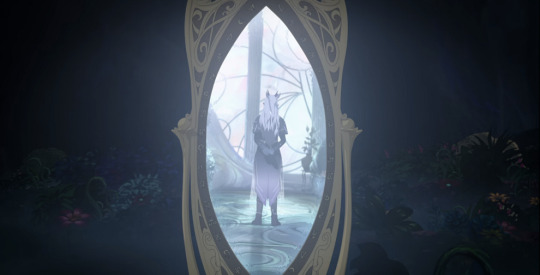
Variants / similarities include huldufolk (Icelandic and Faroese folklore), sirens (Greek), kelpies (Scottish), etc. Over time Christian (bc of course) associations have also been applied as both demoted angels and tempting devils, but that sort of works given one of Aaravos' most prominent comparisons is Lucifer, and Prometheus, who were as crafty and clever as they come.
Basically:
Aaravos emphasis (or lack thereof) regarding his name and the general mystery surrounding it — "My name would mean nothing to you" even in the face of Viren's demands
We see the emphasis on phrasing given that it's been stated by the crew that Aaravos never lies, but we know he purposefully obscures and omits information
Entering into deals and exchanges with humans, giving them gifts and promises (Ziard's staff, Viren's rule for himself and Viren's life for Claudia)
Him seducing Viren yes I said it / everything with Sir Sparklepuff tbh
Fae can also sometimes set trials to pass or tasks for people to fulfil, similar-ish to Aaravos giving Viren a little fetch quest for them to communicate / "Those who fail tests of love are simple animals."
We don't know what Aaravos actually wants, exactly, or why, but given the indifference of the other Startouch elves to humanity's plights (and the fact they've let Aaravos wreak havoc and have never stepped in to stop him) it's a far bet their long, illustrious lives have given them a decidedly warped morality, and that Aaravos is pretty indifferent to other people's immense suffering at this point, too
His mirror realm being its own sort of faerie realm that he can bring Viren in and out of
Aaravos having multiple names and monikers — the Fallen Star, the Midnight Star, one of the Great Ones — much the way the Fae folk have many — the Good Neighbours, the Fair Folk, the Kind Ones, the Wee Folk, the Others (citation).
This isn't as much of a thing but all the nature motifs surrounding Aaravos (Elarion as a flower, the nature-esque patterns on the box that held the Key and that match the key, the flower and vine emulations on his mirror).
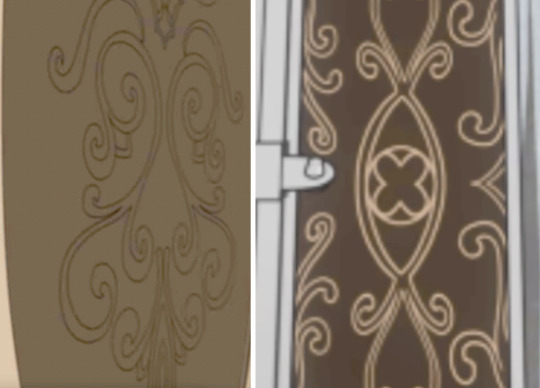

#tdp#the dragon prince#aaravos#tdp aaravos#requests#analysis series#analysis#thanks for asking#anonymous#tdp meta
33 notes
·
View notes
Text
How to Meditate

Assume a comfortable position with your body.
The most recommended posture for meditation is seated cross-legged. This is because it balances support for the body and wakefulness for the mind. However, you can lie down, be seated in a chair, or adopt another similar posture. The main emphasis for meditation posture is that it allows you to focus your attention on the meditation without getting distracted by the body.
Close your eyes and breathe naturally.
Focus your attention on the space directly ahead of you and slightly upwards as the spot between your eyebrows.
In sanskrit, the word for meditation is ‘dhyana’ and it essentially means ‘to pay attention to.’ There are many meditation techniques around but what they all depend on is the application of attention. Here, you want to be gentle with your attention. Do not strain your eyes but be relaxed and attentive. If looking between your eyebrows is a strain, try aiming toward the tip of your nose instead.
Do not deliberately imagine or think about anything. Remain composed, relaxed, and attentive to the space between your eyebrows.
The purpose of meditation is silence and stillness. However, there is a difference between actively thinking and “having” thoughts. Here the instruction is to refrain from actively thinking. This does not mean thoughts should be suppressed from arising.
In meditation, your attention can be focused and relaxed and without thought. Then a thought might arise out of nowhere. This doesn’t mean something bad or wrong happened. You do not need to push the thought away in order to “preserve” or “get to” inner silence. If you do not follow the thought by thinking about it, then it will leave the way it came. If you do follow the thought and find yourself engaged in a train of thoughts, gently bring your attention back to the spot between your eyes and refocus with a calm breath.
In this way, you free your mind from the compulsion to chew needlessly on phenomena appearing in your consciousness.
Set a timer. Do not get up until the timer sounds.
Along with thoughts, many feelings may get churned up during meditation. Some of those feelings may be angry, anxious, energetic, or restless. Do not allow them to control you. If you simply remain seated and attentive with eyes closed, you will be victorious over any thought or feeling that arises. It takes more doing to quit a meditation than to see it through to its end.
Common Issues
My thoughts just don’t stop. They can even get more out of control. What am I doing wrong?
For your whole life, and perhaps others before it, your mind has acquired many habits and imprints. When you sit for meditation, those mental phenomena begin to enter your conscious awareness. That is how they “leave” or are “dissolved.”
This doesn’t mean you forget important things or knowledge but rather the limits you have unknowingly placed on your perceptions are being released. At first, this can be overwhelming. It is not a sign of something wrong, it just requires you to apply sustained effort in the meditation practice.
How can I stop my thoughts?
All you can do is rest your attention and refrain from deliberate thinking. Be patient with your mind and reign in your attention as often as necessary when you find yourself lost in thought. Once rested and focused, your attention simply witnesses whatever thoughts appear. They will settle into silence in their own time. Moments of silence and contentment will occur and deepen.
When meditating, I keep having an emotional experience of pain, sadness, obsession, anger, jealousy, etc. How can I make it go away?
Like thoughts, these emotions are also imprints in consciousness that you have been carrying with you unknowingly. Your body is physically activating pathways associated with experiences that are not actually happening. In meditation, those pathways are allowed to burn themselves out.
You cannot push them away or escape from them. All you can do is give them the space to be there. Like watching a thief, you bear witness to them so as to no longer lose perspective to them. They too will dissipate in time.
My body parts go numb when I sit for so long. What can I do?
It’s fine to stretch out and massage your limbs if necessary during meditation. Try to keep your eyes closed and attention focused when you do.
I feel sleepy when I try to meditate. Why does this happen?
When the mind is not being actively engaged, it can be in the habit of going to sleep. Whenever you feel sleepy during meditation, get up and splash some water on your face and go back to the meditation. If you haven’t been getting enough sleep then forget the meditation and take a nap or go to bed early.
Can I focus on my breath or something else instead of the space between my eyebrows?
Meditation’s key is application of attention. Attention can be applied to the flow of breath, an image, or a mantra. However, as you practice, your awareness will settle down into increasing silence and stillness.
Using the space between your eyes is a silent and still point of focus. Whereas using the breath is a moving point of focus. This has its own benefits and use too. Having practiced several forms of meditation, I like to recommend this way since it worked for me best. That said, feel free to explore in order to find what works for you. Whatever you decide, I would suggest practicing that technique for six weeks to get an appropriate sense of its value.
LY
304 notes
·
View notes
Text


Using tarot with loa
Ive been making post describing how i would intpret cards using loa terminology or concepts but i havent made a post explaining how tarot interacts with loa. If any other blogger has made a post on this i apologize if its repetive.
I also want to say that it doesnt matter what you want to call the phenomenon that is loa. To me, it reflects beleifs that have been held for centuries about god, conciousness and reality , but today many people learn about this phenomenon through the terminology of law of assumption so i don't mind calling it that either.
What is tarot
Tarot is a pack of 78 cards designed for divination. the classic rider deck was made by Author Edward Waite and illustrated by Pamela Cole Smith in the early 20th century, most decks created today are based off this deck. in the creation of the deck, Pamela was inspired by esoteric and pyschic visions as well as things in her real life. Waite also incorporated many concepts from religion and esoterisim into the cards, many cards have references to the kabbalah, astrology, manifestion, spell work, color symbolisim, numerology etc. The cards aren't random, meaningless pictures as some people have asserted, anyone who says that is usually to lazy to learn it so they project their lack of knowledge onto the cards.
☆★☆ Even though tarot has a system of meanings and symbolism attached to the cards, this system is very flexible and you can apply any lense onto the cards. Let's say you were a Christian using tarot; maybe you would interpret judgement to be about repentance, seeking forgiveness and holding yourself accountable. Maybe you would interpret ace of cups as holiness, purity, miracles. Tarot conforms to whatever lense you apply to the cards.
Tarot very easily conforms to the lense of loa because it already explores concepts of conciousness, states of mind, manifestion, reality. It's just a matter of applying what you know to the cards. As I've said in my tarot series, 4 of cups can represent someone not placing emphasis on undesirable things in your reality, and shifting your focus intenrally. The heirophant can represent guides, teachers, coaches, stubborn beliefs, the 9 of cups represents living in the wish fullfilled. Etc.
These interpretations don't stray from the orginal tarot meanings but give them more depth. applying the lense in which resonates with what you believe the most to tarot cards helps you understand what they mean to you personally.
Let's also address the question of whether or not tarot can predict your future.
Yes and no. It can predict what will happen, but not always. The future is not defined by tarot, the future is created by what you do in the present. Sometimes tarot will warn you or pass on information about what will happen if you continue in the state you're in. For example, I once kept getting cards warning me that I was going to have money stolen from me from a female figure who was a pisces. A few weeks later, my mother (who is a pisces) stole 50 dollars from me, I found out because I pulled the 7 of swords AGAIN and when I checked my purse my money was gone, my mom had spent it. If I listened to the warning and understood what it was saying weeks prior, i could have hidden my money and changed my reality. Soo here's my offical answer:
Tarot spontaneously gives glimpses into the future based on what you are doing now.
But for the most part, you can use tarot to reflect subconcious beliefs, what state you're in, what message you need to hear, etc it's best used as a tool to reflect your intenral world back to you because remmeber, the best way to predict the future is to create it
Using tarot to help you in the present is how most readers employ tarot cards anyways, but getting stuck in the cycle of trying to figure out what will happen to you is how people get stuck.
#self concept#money manifestation#money mantra#loa#loa tumblr#loa community#affirmations#vaunts & affirmations#vaunting#neville goddard quotes#neville goddard#manifestion#manifesting money#law of assumption#loablr#loassumption#loa challenge#manifestingmindset#pick a card#tarot readings#law of abundance#tarot loa#pac#pac tarot#living in the end#tarot notes#tarot cards#tarot meanings#astro notes#tarot
74 notes
·
View notes
Text

Appalachian Stoa: Embracing Stoic Philosophy in the Heart of Appalachia
In the ancient city of Athens, nestled beneath the shadow of the Acropolis, stood a place of philosophical discourse and contemplation known as the Stoa. Derived from the Greek word for porch or portico, the Stoa was a gathering place where thinkers, scholars, and citizens alike convened to engage in intellectual debate and reflection.
It was within the tranquil confines of the Stoa that the foundations of Stoic philosophy were laid. Stoicism, with its emphasis on virtue, resilience, and acceptance of fate, found its birthplace amidst the marble columns and shaded walkways of this ancient gathering spot. The Stoics believed in living in accordance with nature, cultivating inner peace, and finding contentment in the face of life's challenges.
Fast forward to the rolling hills and verdant valleys of Appalachia—a region known for its rugged terrain, independent spirit, and deep sense of community. It may seem worlds apart from the bustling streets of ancient Athens, yet the spirit of the Stoa lives on in the hearts and minds of those who call Appalachia home.
Inspired by the timeless wisdom of Stoic philosophy, AppalachianStoa emerges as a modern-day incarnation of the ancient gathering place. Just as the Stoa served as a refuge for seekers of truth and wisdom, so too does AppalachianStoa aim to provide a sanctuary for introspection, learning, and growth.
At AppalachianStoa, we invite you to step onto our virtual porch, where the echoes of ancient wisdom mingle with the rustling of leaves and the gentle hum of cicadas. Here, amidst the tranquil beauty of the Appalachian landscape, we delve into the timeless teachings of Stoicism and explore how they can be applied to our lives today.
In the hustle and bustle of the modern world, it's all too easy to lose sight of what truly matters—to become ensnared in the trappings of materialism, comparison, and distraction. But Stoicism offers us a pathway back to ourselves, a reminder to focus on what is within our control and let go of that which is not.
Through daily reflections, thought-provoking discussions, and practical exercises, AppalachianStoa seeks to cultivate a community of Stoic practitioners united by a shared commitment to living with wisdom, courage, and compassion. Together, we explore the virtues of courage, temperance, justice, and wisdom, striving to embody these principles in our daily lives.
But AppalachianStoa is more than just a repository of philosophical knowledge—it's a living, breathing community, fueled by the collective wisdom and experiences of its members. We welcome individuals from all walks of life, from seasoned Stoics to curious seekers, to join us on this journey of self-discovery and personal transformation.
In the spirit of the ancient Stoics, we embrace the challenges and adversities that life throws our way, viewing them not as obstacles but as opportunities for growth and learning. Just as the Stoics found solace in the serenity of the Stoa, so too do we find solace in the quiet beauty of the Appalachian landscape, drawing strength from the timeless wisdom of the mountains.
As you navigate the ups and downs of life's journey, remember that you are not alone. At AppalachianStoa, we stand together, united in our pursuit of virtue, resilience, and inner peace. So take a seat on our virtual porch, pour yourself a cup of coffee, and join us as we explore the depths of Stoic philosophy amidst the rugged beauty of Appalachia.
#Stoicism#AppalachianStoa#Philosophy#AncientWisdom#SelfImprovement#Resilience#Virtue#Community#StoicPractice#InnerPeace#AppalachianCulture#Mindfulness#Reflection#Growth#Wisdom
8 notes
·
View notes
Text
Oh there’s a comment on my werewolf!Alex/vampire!George post
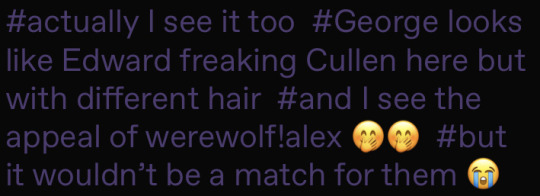
Oh that’s nice, I’m glad other people can see it and it’s not just me being weird. Actually, I-
Wait a second.
What’s this?

Oh @twinkodium. Oh poor unsuspecting soul that has somehow stumbled upon my blog. If only you knew the avalanche you have unknowingly brought upon yourself.
For you, twinkodium, and those of you who have only started following my blog recently, hello. I’m Church, a genderfluid autistic person, whose special interest is wolves with a specific emphasis on werewolves in media. And today I’m here to tell you why Alex Albon could totally theoretically be a werewolf.
DISCLAIMER: I know a lot about wolves and werewolves so my knowledge of Alex Albon is minuscule in comparison. I am more than happy to accept criticisms on the "Could Alex Albon be a werewolf?" debate. However, if you wish to disagree with my knowledge of lycanthropy, you will have to fight me with your own bare hands in the Florida Everglades. Hugs and kisses <3
That being said, let's get into it.
First of all, anyone can be a werewolf. That’s kind of the whole thing. You never know who around you could have a different side, a side they can’t control and might be totally different from the side they show you. But, that’s not what this is about, so let’s get into the actual details, shall we?
1. Lycanthropy has often and continuously been used as a metaphor for transformation.
The reason why I and many other transgender or gender non-conforming people relate to the story of becoming a werewolf, is because there is a fundamental motif of change. Your body changes, your mind changes, even how people perceive you changes. And from this change comes an increased level of awareness of yourself and your place in the world.
For example, it is a common trope in werewolf media that being turned into a werewolf heightens your “natural instincts” and the personality traits that you already showed as a human. A lot of feelings or ideas that were not as prominent in your human form suddenly takes a new presentation that is unavoidable and must be acknowledged (similar to how a lot of the times when people transition, they act in different or more pronounced ways because they now “feel more like themselves”).
Now, how does this apply to our dear friend and case study, Alex Albon? Well, I present you with two occasions in Alex’s public life where a large transformation took place:
A) his transition from F2/Toro Rosso to F1/Red Bull. Alex was a standout driver in Formula 2 and in his rookie season, this is of course why he got promoted. However, the shift from a high-performing car (when he started in Red Bull) suddenly brought to light a lot of small intricacies in Alex’s driving, some good and some bad (much like how transforming from one species to a more powerful one brings out a lot of traits that you could hide/did not seem as large before).
B) The second transformation is Alex’s change from Red Bull to Williams. The thing about lycanthropy is that even in “human” form, you still retain a lot of lupine traits. And taking that as a metaphor for Alex’s driving, you can see how Alex’s progression in Red Bull and his adaptation to high performing cars makes him out-drive the current Williams car.
HOWEVER. I don’t actually think Alex’s driving career has as much to do with why he’d be a werewolf as the simple fact that: Alex himself loves the act of transformation. All F1 drivers have some level of appreciation for change to do what they do, but not only does Alex transform himself to specific situations, he also just transforms himself for fun (re: dying his hair on a monthly basis).
Okay now on to criteria number 2:
2. Wolves are intrinsically shaped within a pack structure and need constant connection with their species to prosper.
In that same vein, there is often a lone wolf vibe to werewolves in media because they are expelled from both natural human and wolf societies as a stage between the two.
Not only does Alex Albon have a big ass family (I say big but it is of course relative, but wolves do live in family structures made up of 5-9 members) but he has an entire zoo of animals (I am actually not even sure how many but at least in the double digits). This man screams pack structure. And this is not only shown in his actual family life, but also in his interactions with his teammates and friends on the grid. Alex Albon is a social animal and that's what wolves are.
Now, for the "lone wolf" aspect, of course Alex is in a very self-centered sport. But, drawing from my own experiences, being of mixed race can also feel very lonely. You're not 100% one or the other because there are always going to be aspects of yourself that depend on the fact that you're both. Alex Albon is both British and Thai and has said himself that it can be difficult (for example: "when I'm doing well I'm British and when I'm doing poorly I'm not British").
A large part of the overarching lycanthropic story is trying to find connection when you've constantly been isolated. For Alex, I see this most in the change from Red Bull to Williams. Red Bull is a lone wolf structure and Williams is a pack structure and we all know which one Alex has thrived more in.
Moving on to criteria number 3:
3. Werewolves in media have their senses dialed up to 11 and they often emote more and act in certain ways that feel more instinctual.
I don't feel like I have to say much about this. Alex Albon is the king of emoting. It's impossible for him to hide his emotions, when he's annoyed he looks annoyed, when he's happy he looks happy. And often this shows itself in strong ways (the iconic meme of him yelling "George").
HOWEVER! (I've been saying however a lot but still, however) a big big big thing in the overarching werewolf story is control. You have to have control to be palatable, to not outcast yourself or give yourself away. That's why I think even though Alex doesn't blow up like Yuki, or have his emotions literally bursting out of his body like Daniel, he's still a really good representation of how lycanthropy can (hypothetically) make you present your emotions in a very large way.
Bonus Criteria: Looks
I have focused on personality and storyline for the most part of this post and for a reason. However it must be said:

Does this man not look like a werewolf?? I mean, honestly, idk what y'all think a werewolf looks like, but this is it. The wider, flatter nose, the shaggy hair, the eyebrows. Even his chin man, idk how to describe it.
Anyway, this is where I rest my case. If this gets any attention, I might attempt to do a post on why I think vampire!George is totally realistic, but I am much more a werewolf enthusiast than a vampire enthusiast so we'll see. If you got to the end, congratulations, you deserve a cookie.
Werewolf!Alex Albon forever.
#you made me ignore the studying i have to do twinkodium#but i absolutely could not let this slide#long post#dissertation#alex albon#williams racing#formula 1#f1#aa23#werewolves#wolves
19 notes
·
View notes
Note
I would like to draw more but I find myself overthinking it and then losing motivation. So, I was wondering if you ever had a similar issue and if so what do you do to stay motivated and not overthink?
Really good question actually!
What nipped the overthinking for me was just completely dropping the planning stage of drawing. I don't put much thought into composition, colors, etc. I don't have any solid ideas of how I want things to look before I begin. Obligatory disclaimer that this is from my perspective as a hobbyist and therefore not practical for an aspiring professional, & this is gonna sound like BS but hear me out lol
Most of the time the only things I have in mind are 1. What character(s) I want to draw and 2. A vague idea of the atmosphere I want the finished product to convey. And "finished" can mean a lot of things -- a messy sketch can be finished, a fully rendered piece I spent an entire day could be finished. A common pitfall people fall into is having an impractically rigid idea of what a "finished" drawing is and subsequently what they want their art to look like, all the bells and whistles etc, when realistically your art is never going to look exactly how it did in your head. But is that really such a bad thing?
I guess the overarching concept is to just fall in love with the process and enjoy the journey rather than the destination. This obviously sounds easier than it is in reality, but imo people focus way too hard on what they're producing rather than how and why they're producing it. Other people loving what you draw and praising it is wonderful, but if you don't enjoy the process, what was the point? Drawing (and I would venture to say most other forms of art in general) becomes a chore with that mindset applied.
A lack of planning may very well mean you wind up drawing a lot of stuff that doesn't seem interesting, maybe haphazard, difficult to parse, etc, but this is all your perception. It's cliché, but there is always going to someone out there that adores something you think looks like a dumpster fire, and that applies to the things you draw too. Over time, just doing whatever you want and enjoying the process has this trickle effect that will improve your output. In the same vein, constantly overthinking will also inevitably trickles into your output. You can often tell when someone enjoyed the process of something they drew vs when it was just a slog for them to get through (at least relative to their other works).
I would venture to say that you could spend your entire life studying and could be the most technically knowledgeable person about illustration ever in the world, but if you don't genuinely love the process, your work will never be as good as it could be if you did.
If you finish something and think it looks like shit that's always a bummer, but if you had fun with it, I think that was time worth spending. I've said this before, but most of the time I only truly dislike something I've drawn when I spent any part of the process frustrated with how it was going. It's counterintuitive, but I really think that placing so much emphasis in how you want the finished product to look is what ultimately is going to make it look like shit to you.
All that being said, once you do get past that initial overthinking phase, you can start to get more specific with planning and whatnot. The key is to just stop holding onto the idea of what you want and allowing things to develop as you go. Your art will naturally improve this way since you're actually enjoying it. To me, that's what people mean when they say they can tell something was made with love.
Side note: Let go of the need to be consistent/have a developed style. Just let yourself be inconsistent. You don't need strict consistency unless you're like an animator who needs to keep characters on-model or something. Experimenting is not only way more fun, but leads to improvement and discovering new things to implement into your process/style at large.
Tl;dr just get a lil silly w it :3c
#hope this made sense i feel like it sounds like mumbo jumbo but it works for meee#yip yap#if you saw those typos no you didnt
17 notes
·
View notes
Text
Far Away (and Breathing Cleaner Air)
Rating: Mature
Archive Warning: No Archive Warnings Apply
Category: F/F
Fandom: Grease: Rise of the Pink Ladies (TV)
Relationship: Lydia/Cynthia Zdunowski
Characters: Cynthia Zdunowski, Lydia (Grease: Rise of the Pink Ladies), Edward "Shy Guy" (Grease: Rise of the Pink Ladies), Pedrito "Potato" (Grease: Rise of the Pink Ladies), Nancy Nakagawa, Summer Stock Girl (Grease: Rise of the Pink Ladies)
Additional Tags: Post-Canon, Living Together, Suggestive Themes, Implied Sexual Content, Non-Sexual Intimacy, Angst, Hurt/Comfort, Protective Cynthia Zdunowski, Period Typical Attitudes, Internalized Homophobia, Underage Drinking, kinda???, Google says the drinking age in California in '57 was 21, and they're not quite there yet, Domesticity, The inherent homoeroticism of doing your girlfriend's hair, Betaed, featuring the beta reader's obscure drink knowledge, The T-Birds love Lydia, So do the Pink Ladies, La Traviata, Symbolism, so much symbolism, A single use of the fuck word, for Emphasis, if you know you know, Mild Language, Clyde reference Fanwritten season two project my beloved
Language: English
Series: ← Previous Work Part 2 of Like Phantom Limbs
Stats:
Published: 2023-07-31, Words: 16,024, Chapters: 1/1
Summary:
Words don't always mean what you might think. Home can be as simple as four walls where the world can't touch you. A family is a group of friends who love and support you as you are. Sometimes healing involves breaking further apart, even years later. And loving someone means helping them put those pieces back together.
(Title from Icarus by The Crane Wives)
Notes:
Massive, massive thank you to my dear friend who enabled my hubris and betaed this for me, @look-at-those-niceass-rocks on tumblr (if you follow me there, you'll recognize them from the unhinged quotes lists as we watched the series together). Highly recommend getting yourself a friend like them; I said I wanted more Crane Wives lyrics for titles and they went through each song line by line and wrote down what resonated with the themes I was working with. This being over 16k words is entirely their fault.
Enjoy!
Note: this is a direct sequel to Steady, Steady. While it is not strictly necessary to read that one first to understand this, there are some references and symbolism that might go over your head otherwise, specifically in regards to my characterization of Summer Stock Girl.
(See the end of the work for more notes.)
The summer of 1957 promised to be a warm one. The sun hung heavy in the sky most days, unobstructed by clouds, casting a hazy heat over central California. Not the best weather to move house in, but honestly? Cynthia didn’t think there was anything that could wipe the smile from her face this week. The house itself was quaint. Much nicer than the apartment she grew up in, that’s for sure, but small for the number of people that would be living there. Three bedrooms, two bathrooms, and, for the most part, six girls.
The plan had been Jane’s idea, proposed in Olivia’s bedroom at a Pink Ladies sleepover during Christmas break. One semester at Stanford under her belt, and she was already sick of the dorms. Ranting about her nightmare roommate eventually turned into daydreaming about the five of them living together, which over the next few weeks, turned into a solid plan. A little house in between Rydell and Stanford, somewhere they could all get used to independence without sacrificing getting to see their loved ones. A place she, Olivia, and Cynthia could live year-round, and a nest where Hazel and Nancy could land when school breaks brought them back west.
And with an odd number of girls in their group, it was only natural that Cynthia brought up Lydia. To make it even, of course. She endured the teasing and kissy faces with a thrown pillow and a promise to give each of them the same treatment when she inevitably caught their boys sneaking out in the mornings.
For all their teasing, they were all very encouraging about bringing Lydia into their midst. She had never formally joined their gang, but she’d never been excluded, and they had never treated her any different than the other partners, and for that, Cynthia was beyond grateful.
And so, now, six months after that conversation, two weeks after signing the lease, her girlfriend was moving into their shared bedroom, and her face hurt from the grin that had been plastered there since the night before. A tired sigh made her look up from the clothes she was hanging in the closet and she watched Lydia set a box atop a small pile.
“Last one!” she breathed out, exhausted, wiping a hand across her brow as she walked toward the foot of the bed. There, she turned on her heel, arms wide, to fall backward on the mattress.
Cynthia chuckled at the sight. She moved, almost unbidden, from her spot against the wall, crossing the room in quick easy strides to sit on the bed next to her girlfriend. She leaned over the other girl, arm propping her up on her other side as she pressed a kiss to the spot between the girl’s closed eyes. Lydia preened at the affection, and Cynthia felt her arm wrap around her waist, holding her in place.
“Having fun yet?” she asked, and Lydia laughed.
“After eight months of shitty dorm mattresses,” she replied, relaxing further into the plush duvet, “you have no idea how good it feels to lay in a real bed!”
Cynthia trailed the back of her finger along the slope of the other girl’s cheek, tracing a pattern only she could see. Lydia finally pried her eyes open and caught her gaze, a storm meeting the sea, and Cynthia moved her hand to cup the other side of her face.
“Our bed,” she whispered, reverently, as if she couldn’t believe it. Lydia’s smile broadened into a toothy grin.
“Our bed!” she agreed.
(Continue reading on ao3)
#Behold my magnum opus#the ao3 feed is being weird#it's not showing up there for me#but is for some people???#idk man#grease: rise of the pink ladies#grease rise of the pink ladies#cynthia x lydia#cynthia zdunowski#lynthia#thesbians#rotpl#lydia rotpl#grease rotpl#save rotpl#save rise of the pink ladies#save grease rise of the pink ladies#save our pinks#shy guy rotpl#potato rotpl#nancy nakagawa
33 notes
·
View notes